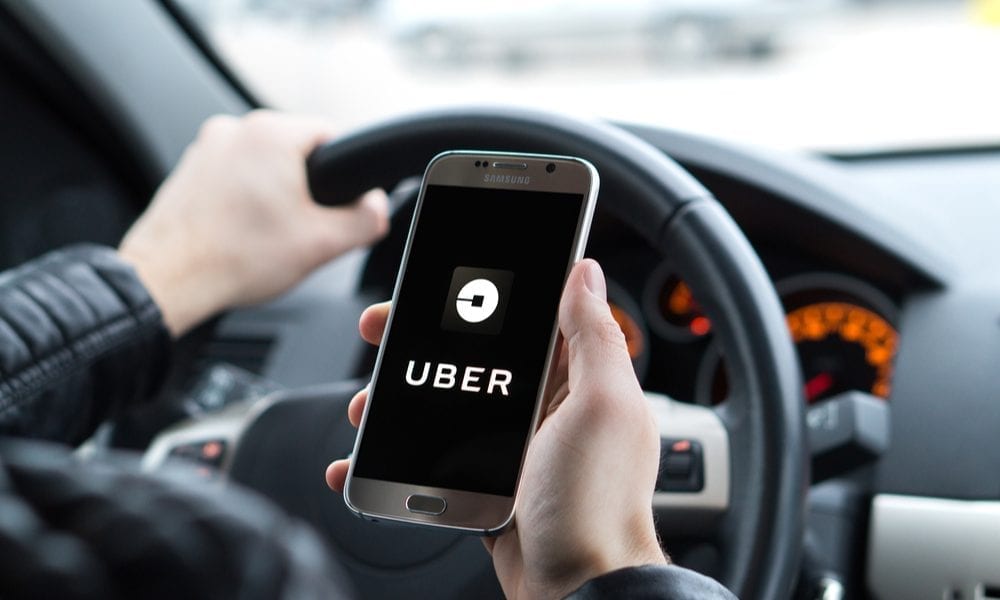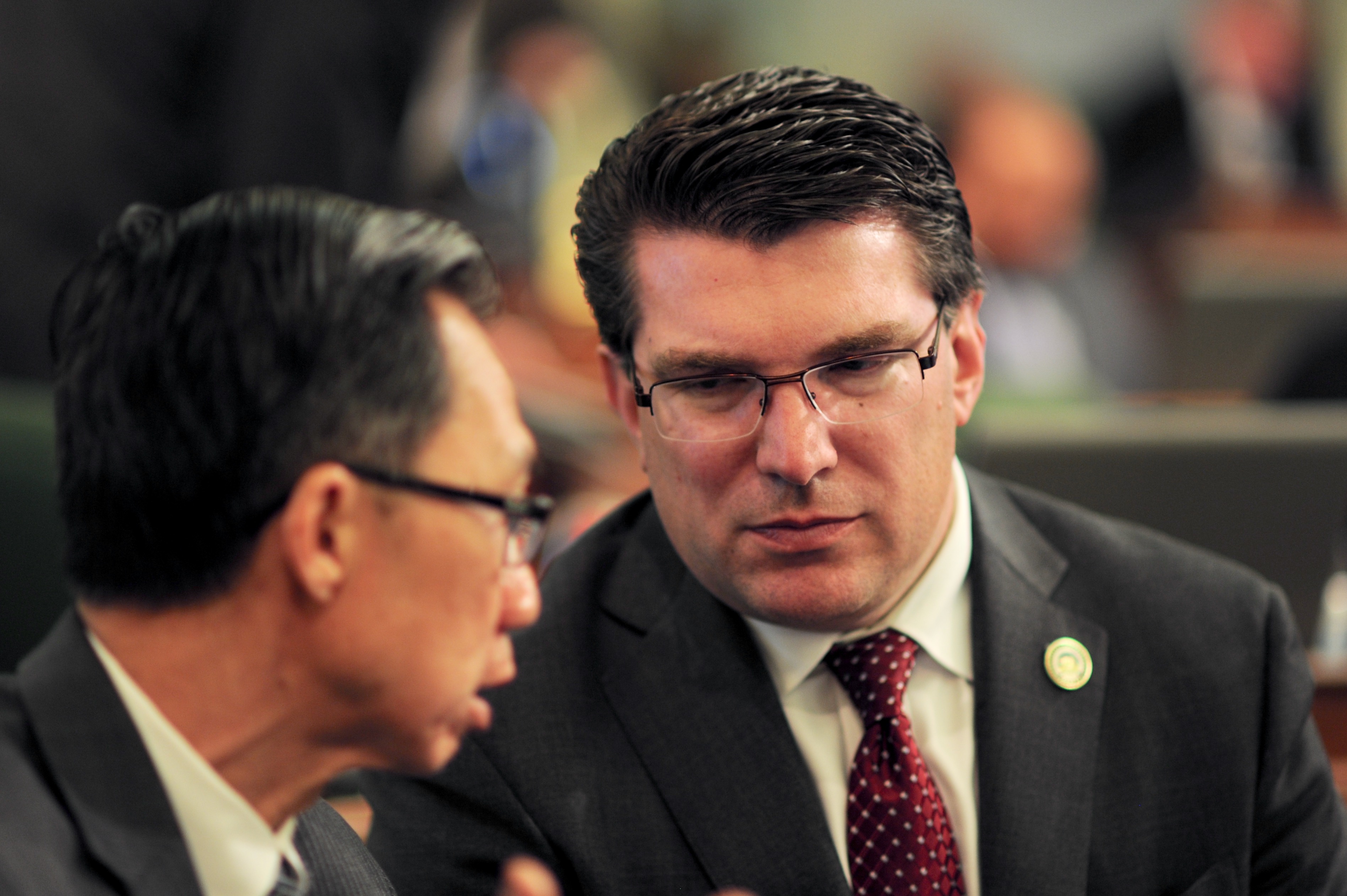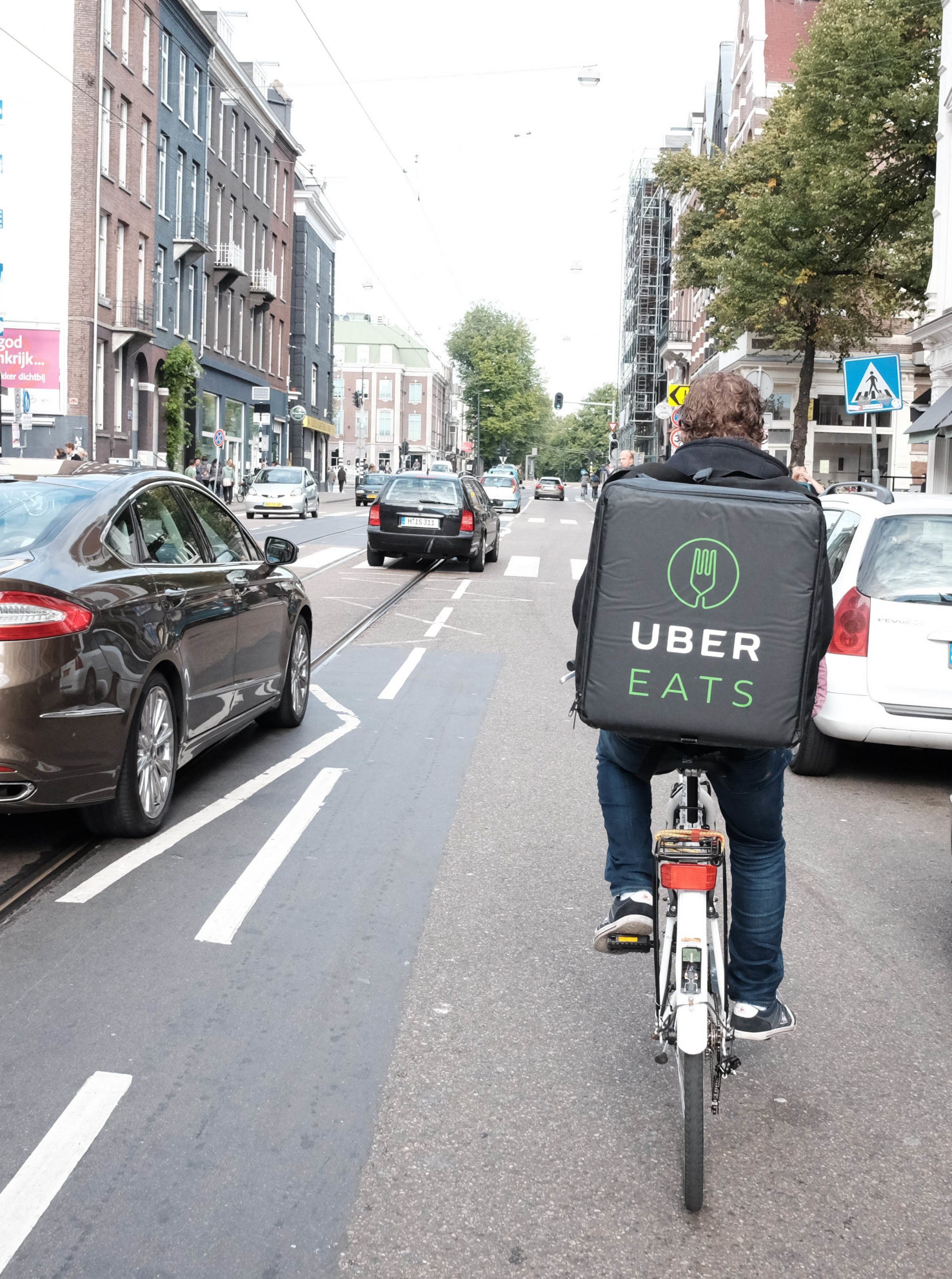
The Uber phone app. (Photo: Youtube)
Prop. 22 Creates New Employment Designation
Protecting independence for ‘app-based drivers’
By Chris Micheli, November 4, 2020 3:37 pm
Approved by almost 60% of California’s voters, Proposition 22 on the November 3, 2020 general election ballot creates a new employment designation in California law for “app-based drivers.” The following is a review of the new statutory language that was adopted by the voters in Prop. 22:
Section 1. Prop. 22 adds new Chapter 10.5 to Division 3 of the Business and Professions Code (beginning with Section 7448), which is titled “App-Based Drivers and Services”.
Article 1. Title, Findings and Declarations, and Statement of Purpose.
Section 7448. Prop. 22 is known and can be cited as the Protect App-Based Drivers and Services Act.
Section 7449. Prop. 22 makes certain findings and declarations including that recent legislation (i.e., AB 5) “has threatened to take away the flexible work opportunities of hundreds of thousands of Californians…” And that “this chapter is necessary to protect their freedom to work independently, while also providing these workers new benefits and protections not available under current law.
“These benefits and protections include a healthcare subsidy consistent with the average contributions required under the Affordable Care Act (ACA); a new minimum earnings guarantee tied to one hundred twenty percent (120%) of minimum wage with no maximum; compensation for vehicle expenses; occupational accident insurance to cover on-the-job injuries; and protection against discrimination and sexual harassment. “
Section 7450. Prop. 22 makes certain statements of purpose including to “protect the individual right of every app-based rideshare and delivery driver to have the flexibility to set their own hours for when, where, and how they work,” as well as to “improve public safety by requiring criminal background checks, driver safety training, and other safety provisions to help ensure app-based rideshare and delivery drivers do not pose a threat to customers or the public. “
Article 2. App-Based Driver Independence.
Section 7451. Protecting Independence. Regardless of any other law, an app-based driver is an independent contractor and not an employee or agent with respect to his or her relationship with a network company if the following conditions are met:
(a) Network company does not unilaterally prescribe specific dates, times of day, or a minimum number of hours during which the app-based driver must be logged into the network company’s online-enabled application or platform.
(b) Network company does not require the app-based driver to accept any specific rideshare service or delivery service request as a condition of maintaining access to the network company’s online-enabled application or platform.
(c) Network company does not restrict the app-based driver from performing rideshare services or delivery services through other network companies except during engaged time.
(d) Network company does not restrict the app-based driver from working in any other lawful occupation or business.
Section 7452. Contract and Termination Provisions. Network company and an app-based driver must have a written agreement and the contract cannot be terminated by the network company unless it is based upon a ground specified in the contract. And an appeal process for terminated contracts must be provided.
Section 7452.5. Independence Unaffected. Nothing in this chapter shall be interpreted to in any way alter the relationship between a network company and an app-based driver where the Section 7451 conditions have been met.
Article 3. Compensation.
Section 7453. Earnings Guarantee. Network company shall ensure that for each earnings period, an app-based driver is compensated at not less than the net earnings floor as set forth. For each earnings period, a network company shall compare an app-based driver’s net earnings against the net earnings floor for that app-based driver during the earnings period.
In the event that the app-based driver’s net earnings in the earnings period are less than the net earnings floor for that earnings period, the network company shall include an additional sum in the app-based driver’s earnings no later than during the next earnings period accounting for the difference. No network company or agent can take any gratuity left for an app-based driver by a customer or deduct any amount from the earnings due. This section defines the following terms: “Applicable minimum wage”; “Earnings period”; “Net earnings”; and, “Net earnings floor”.
Article 4. Benefits.
Section 7454. Healthcare Subsidy. Network company shall provide a quarterly healthcare subsidy to qualifying app-based drivers as set forth in this section. An app-based driver that averages the following amounts of engaged time per week on a network company’s platform during a calendar quarter shall receive specified subsidies from that network company.
For 25 hours or more, 100% of the average ACA contribution for average monthly Covered California premium and for less than 25 hours, but more than 15 hours, 50% of the average ACA contribution. A network company must provide specified information to each app-based driver. The network company may require proof of current qualifying health plan enrollment.
Nothing in this section shall be interpreted to prevent an app-based driver from receiving a healthcare subsidy from more than one network company for the same calendar quarter. This section becomes inoperative if the federal or state governments implement a universal healthcare system or its equivalent.
Section 7455. Loss and Liability Protection. No network company shall operate in California for more than ninety (90) days unless the network company carries, provides, or otherwise makes available specified insurance coverage:
Occupational accident insurance to cover medical expenses and lost income resulting from injuries suffered while the app-based driver is online with a network company’s online-enabled application or platform, including $1 million for medical expenses and disability payments of 66 of the average weekly earnings for all network company drivers.
Accidental death insurance for injuries suffered by an app-based driver while the app-based driver is online with the network company’s online-enabled application or platform that result in death.
Occupational accident insurance shall not be required to cover an accident that occurs while online but outside of engaged time where the injured app-based driver is in engaged time on one or more other network company platforms or where the app-based driver is engaged in personal activities. “Online” is defined. These benefits are considered amounts payable under a workers’ compensation law or disability benefit for purposes of the Uninsured Motorist Act.
A DNC shall maintain automobile liability insurance of at least $1 million per occurrence to compensate third parties for injuries or losses proximately caused by the operation of an automobile by an app-based driver during engaged time in instances where the automobile is not otherwise covered by a policy.
Article 5. Anti-Discrimination and Public Safety.
Section 7456. Anti-Discrimination. It is an unlawful practice, unless based upon a bona fide occupational qualification or public or app-based driver safety need, for a network company to refuse to contract with, terminate the contract of, or deactivate from the network company’s online-enabled application or platform, any app-based driver or prospective app-based driver based upon race, color, ancestry, national origin, religion, creed, age, physical or mental disability, sex, gender, sexual orientation, gender identity or expression, medical ·condition, genetic information, marital status, or military or veteran status. Claims brought under this section shall be brought under the Unruh Civil Rights Act.
Section 7457. Sexual Harassment Prevention. A network company shall develop a sexual harassment policy intended to protect app-based drivers and members of the public using rideshare services or delivery services. The policy shall be available on the network company’s website and must be specified items. An app-based driver must review the sexual harassment policy and confirm such review.
Section 7458. Criminal Background Checks. A network company shall conduct, or have a third-party conduct, an initial local and national criminal background check for each app-based driver who uses the network company’s online-enabled application or platform to provide rideshare services or delivery services.
No additional consent shall be required for the continual monitoring of that app-based driver’s criminal history if the network company elects to undertake such continual monitoring. A copy or summary of the check must be provided to the driver. A driver is prohibited from using an online application or platform if the driver has been convicted of any crime listed in Public Utilities Code Section 5445.2(a)(2)(B).
Section 7459. Safety Training. A network company shall require an app-based driver to complete the training described in this section prior to allowing the app-based driver to utilize the network company’s online-enabled application or platform. Safety training required is specified in this section. The training may be provided at the discretion of the network company.
Any app-based driver that has entered into a contract with a network company prior to January 1, 2021 to provide rideshare services or delivery services shall have until July 1, 2021 to complete the safety training required by this section, and may continue to provide rideshare services or delivery services through the network company’s online-enabled application or platform until that date. Any efforts undertaken by the network company to further public safety is not indicia of an employment relationship with the app-based driver.
Section 7460. Zero Tolerance Policies. A network company shall institute a ”zero tolerance policy” that mandates prompt suspension of an app-based driver’s access to the network company’s online-enabled application or platform in any instance in which the network company receives a report through its online-enabled application or platform, or by any other company approved method, from any person who reasonably suspects the app-based driver is under the influence of drugs or alcohol while providing rideshare services or delivery services.
Section 7461. App-based Driver Rest. An app-based driver shall not be logged in and driving on a network company’s online-enabled application or platform for more than a cumulative total of 12 hours in any 24-hour period, unless that driver has already logged off for an uninterrupted period of 6 hours.
Section 7462. Impersonating an App-Based Driver. In addition to other penalties provided by law, every person who falsely impersonates an app-based driver providing rideshare services or delivery services shall be guilty of a misdemeanor, and is punishable by imprisonment in a county jail for up to three months, or a fine of up to $10,000, or both.
Article 6. Definitions.
Section 7463. The following definitions are provided: “App-based driver”; “Average ACA contribution”; “Average monthly Covered California premium”; “Covered California”; “Customer”; “Delivery network company”; “Delivery network company courier”; “Delivery service(s)”; “Engaged miles”; “Engaged time”; “Local government”; “Network company”; “Passenger vehicle”; “Qualifying health plan”; “Rides share service(s)”; “Transportation network company”; and, “Transportation network company driver”.
Article 7. Uniform Work Standards.
Section 7464. The State occupies the field in the following areas:
(1) App-based driver compensation and gratuity, except as provided in Section 7453.
(2) App-based driver scheduling; leave; healthcare subsidies and any other work-related stipends, subsidies, or benefits.
(3) App-based driver licensing and insurance requirements.
(4) App-based driver rights with respect to a network company’s termination of an app-based driver’s contract.
Article 8. Amendment.
Section 7465. The Legislature may amend this chapter by a statute passed in each house of the Legislature by rollcall vote entered into the journal, seven-eighths of the membership concurring, provided that the statute is consistent with, and furthers the purpose of, this chapter.
Also, a bill seeking to amend this chapter must be in print in its final form at least 12 business days prior to its passage in either house of the Legislature. In addition, no statute enacted after October 29, 2019, but prior to the effective date of this chapter, that would constitute an amendment of this chapter, shall be operative after the effective date of this chapter unless the statute was passed in accordance with the requirements of this subdivision. No statute amending Section 7451 furthers the purposes of this chapter.
Article 9. Regulations.
Section 7466. Emergency regulations may be adopted by Covered California in order to implement and administer the sections above. Any emergency regulation must be adopted pursuant to the Administrative Procedure Act.
Article 10. Severability.
Section 7467. The provisions of this chapter are severable. Nonetheless, if any portion of Section 7451 is for any reason held to be invalid by a decision of any court of competent jurisdiction, that decision shall apply to the entirety of the remaining provisions of this chapter, and no provision of this chapter shall be deemed valid or given force of law.
Section 2. Conflicting Measures. In the event that this initiative measure and another ballot measure or measures dealing, either directly or indirectly, with the worker classification, compensation, or benefits of app-based drivers shall appear on the same statewide election ballot, the other ballot measure or measures shall be deemed to be in conflict with this measure and, if this measure gets the greater number of votes, then its provisions shall prevail in their entirety.
Section 3. Legal Defense. The purpose of this section is to ensure that the people’s precious right of initiative cannot be improperly annulled by state politicians who refuse to defend the will of the voters. If both the Governor and Attorney General refuse to defend this Act, then specified actions shall be taken (independent counsel appointed by the AG).
Section 4. Liberal Construction. The act is to be liberally construed in order to effectuate its purposes.
- Frequently Asked Questions about State Agency Ethics Training - April 26, 2024
- Frequently Asked Questions about When Elected Officials Take Office - April 25, 2024
- Frequently Asked Questions About Ethics Training for Local Agencies - April 24, 2024





One thought on “Prop. 22 Creates New Employment Designation”